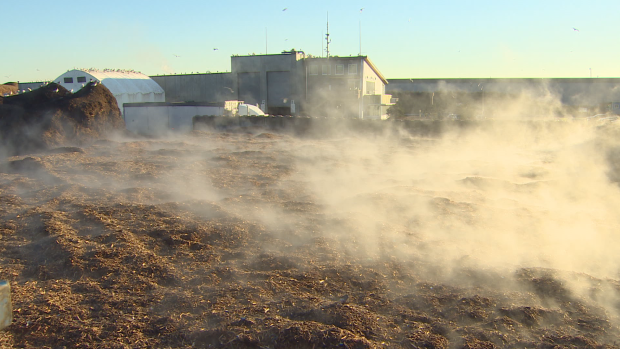Harvest Power now has almost four years to get its pungent odours under control, after Metro Vancouver granted the compost facility a new permit with more stringent conditions late last week.
Mayor Malcolm Brodie took the news with cautious optimism.
“I am not at all satisfied at this point but I’m willing to work with Metro Vancouver and our staff and Harvest Power to hopefully measure the improvement,” said Brodie.
The new permit runs until April, 2020 and the waste-to-energy company will need to comply with new enforcement and monitoring measures, following numerous complaints from Richmondites that compost smells have wafted into their daily life, thus impacting liveability and, potentially, their health.
“It’s going to take a while to remedy the situation,” admitted Brodie.
The east Richmond facility will face fewer opportunities in which it will be allowed to produce odours without penalty. For instance, in 2017, smells may be detected within five kilometres, twice a week. By 2019, smells may be detected within just three kilometres, once a week. The permit doesn’t spell out what kind of penalties the company could face, however it may be ordered to stop taking in more waste, thus impacting its revenue stream.
Exactly how it will be determined if Harvest is the culprit of odours in the air has been a point of contention in the past.
In order to determine whether the smell is from Harvest Power, Metro’s district director Ray Robb will depend on written reports from the company, wind direction at the time of the smell and the odours described by the complainants.
Brodie said it is obvious when the facility is emitting foul odours, despite the company claiming it is but one of many odour emitters in the region (Richmond is surrounded by three wastewater treatment facilities).
“I’m satisfied that the vast majority, the vast majority of what we smell in terms of the daily odours is from Harvest Power,” said Brodie.
Harvest must present Metro with a detailed annual report of total discharges of sulphur oxides, nitrogen oxides and total volatile organic compounds. It’s also bound to write quarterly updates on issues such as testing, compost levels and facility upgrades.
Harvest will be forced to reduce its compost piles by half, to allow more oxygen into the soil so odours don’t fester. However, there appears to be no immediate plans to move the facility indoors, build bioscrubbers or have Harvest build a smoke (odour) stack to disperse the smells, such as that at a new compost facility in Surrey.
In a statement, Harvest Power’s CEO Chris Kasper said the company plans to spend millions of dollars on facility upgrades.
“We heard loud and clear that the public expects us to do better,” added Kasper. “And we’re committed to address their concerns. Now that we have the permit, we can focus our efforts and investments to deal with the issues that have been raised.”
Harvest Power serves Metro Vancouver’s goal of eliminating organic waste from the landfill. The company creates compost and turns bio-gas into electricity for revenue.



